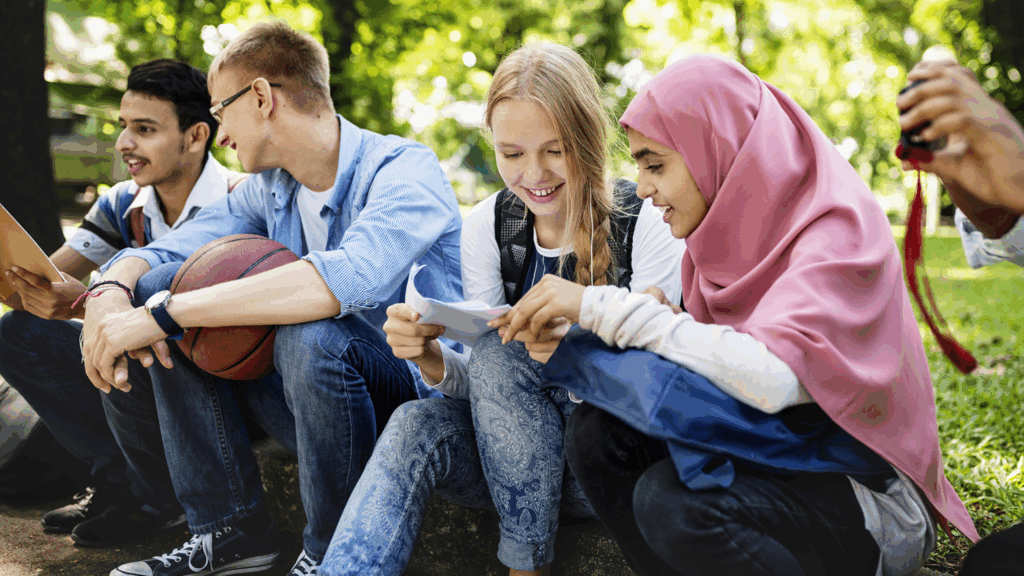In these times of separation, remaining connected to each other and in service to our communities is more important than ever. As students around the world move into the space of online education how can we ensure they stay engaged in ‘service’, continuing both their learning and active global citizenship?

Different ways to serve
Whilst we may immediately think of direct action when we think of service, there are actually three other types of action: indirect, advocacy and research. Direct action involves working directly with a partner organisation or on a community need. This could be ‘in person’, but it could also include online correspondence and communication of a worthwhile kind.
Although currently many students are unable to engage in direct, in-person action, the other types of service offer pathways for students to continue their service work.
When engaging in indirect service students do not meet the recipients of their work, but they take informed action that benefits the community need. This can include activities such as fundraising or making collections. Advocacy involves speaking on behalf of a community need, raising awareness about the issue and hopefully inspiring others to take action of their own. Research is a process of gathering relevant information, then analysing and reporting on it, with the aim of having an impact.
Learning for service
Prior to or during service experiences, students may need to learn new skills or qualities, or further develop existing skills and qualities. They may also need to gain additional knowledge in certain areas which will help them to participate in their service experience in a fully informed manner.
For example, compassion is an obvious core quality that, when embodied, enriches and deepens the service experience. A compassionate student is more likely to connect with the issue or concern and the people or environment involved, feeling an intrinsic desire to support through service in a meaningful way. Students can cultivate compassion through reflective activities and also through the practice of mindfulness.
Consider, as another example, a student that is already working alongside a not-for-profit organisation, becoming aware that this group needs support with organising their bookwork. The student may decide to learn new bookwork skills to help the organisation implement systems and train staff to raise the level of their internal administration.
Investigation for service
Also falling into the category of learning for service, investigation is the first step in the cycle of service or the CAS stages and involves inquiry into the chosen community need or partner organisation. Investigation can also include the process of researching community issues in order to determine needs and decide on a course of action for a service experience.
For example, students could investigate the context of a chosen partner organisation, researching the historial, political, economic, socio-cultural and environmental factors that influence it on a day to day basis. Alternatively students could research a chosen community need, finding out all they can about what it is, why it occurs and who it affects. There are different tools which can support investigation for service, but one popular one is the MISO (Media, Interview, Survey, Observation) action research method.
Ideas for Service
The following list of ideas can help keep older learners engaged in service during school closures and the move to online delivery.
Self Development for Service
- Qualities of Service
- Ask students to consider the qualities that they believe are beneficial in service experiences, e.g. compassion, resilience, gratitude. They could make a list and explain their reasoning behind choosing each one.
- Students could research the cultivation of these qualities, discovering some ways to deepen their own embodiment of each one. Encourage them to explore mindfulness as a way to do this, and set a goal to develop one or two qualities over the coming weeks.
- Skills for Service
- Ask students to consider the skills that are necessary in service experiences. If the students are not already working alongside a partner organisation or on a community need they will need to think broadly. If they already have a connection they can brainstorm in relation to their existing work.
- Once they have a list of skills students could choose one to work on over the coming days or weeks. What kind of resources could they find online to help them develop in this area? What steps might they take to work on this?
- Investigating for Service
- If students are already connected to a partner organisation or community need they could work to deepen their understanding of the context relevant to this organisation or need. Encourage them to research the historial, political, economic, socio-cultural and environmental factors that exist. What kind of impact do these circumstances have on the partner organisation or community need?
- If students are not already connected to a partner organisation or community need, they could research and find one that they are passionate about, and then inquire into the context as above.
Connecting with Others
- Service Groups
- Students may already be in service groups – if they are, make sure that they have a way to connect as a group online and conduct discussions. Prompt questions relevant to their chosen service engagement will help them to stay connected to the action they were taking prior to school closures. Here are some ideas:
- How may the community need or partner organisation you were working with be impacted by the current global situation?
- What further resources or support might be needed?
- Could you take a form of action other than direct in-person action to support?
- Students may already be in service groups – if they are, make sure that they have a way to connect as a group online and conduct discussions. Prompt questions relevant to their chosen service engagement will help them to stay connected to the action they were taking prior to school closures. Here are some ideas:
- Community Need or Partner Organisation
- If students are already working on a community need or with a partner organisation it may be appropriate for them to reach out and connect with the people they were working alongside. Ensure this is coordinated within the group and the communication is from a group representative rather than each individual student.
- They could explore other areas that they could support, through indirect service, advocacy and research.
- If students are not already engaged in a service experience, they could reach out to any groups or organisations that are doing meaningful work that they are passionate about. Working in groups or individually they could see if they could take some action to support the cause.
Online Resources
- The 50th anniversary of Earth Day will occur on the 22nd of April 2020. Encourage students to stay tuned to the Earth Day Website for online events.
- The Global Goals Website holds information about the Sustainable Development Goals, along with ideas about ways to support the achievement of each of the goals. These 170 Daily Actions are also a great read.
- The Akosha Lead Young website features videos of great young change makers from around the world. Encourage students to explore and get inspired!
These are just a few ideas that may help. A silver lining to the current global crisis could be that humanity awakens to the depth of our interconnectedness, and realises that it is through service to each other and the world that we will change our planet for the better. Providing avenues for students to stay engaged in service through times when they are unable to attend their schools in person could help students to realise this. It could also help them feel empowered to take action despite their dramatic change in circumstances.
The article is based on the content of Be The Change by Orenda Learning.

Orenda Learning is an impact driven organisation that supports active citizenship through the delivery of best practice service programs. Our Strategic Intent is to equip young people with crucial knowledge, skills, qualities and the agency to affect positive global transformation in our rapidly changing and complex world.





